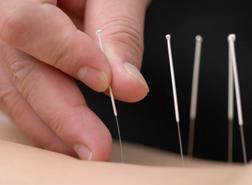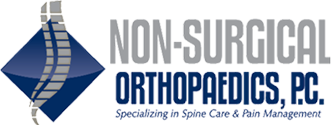Acupuncture Treatments in Marietta, GA

Acupuncture, an ancient healing practice originating from traditional Eastern medicine, has long been respected for its therapeutic benefits. Although there are differences in treatment modalities, the goal of acupuncture and regenerative therapy are similar – harness the body's natural healing capacity to restore and rejuvenate tissues.
Dr. Arnold J Weil, one of our experienced orthopaedic and pain management specialists, has trained in the art of acupuncture. He understands how to combine acupuncture with more traditional pain management therapies, sports medicine and regenerative therapies to develop comprehensive treatment plans for patients experiencing chronic and acute pain.
Understanding Acupuncture in Regenerative Medicine
Properly targeted acupuncture therapy stimulates acupoints that are believed to correspond to energy pathways in the body. The goal of this regenerative treatment is to positively influence healing by triggering a focused physiological response, such as tissue repair, inflammation modulation and cellular regeneration.
Key synergies between acupuncture and regenerative medicine include:
- Enhanced blood circulation – Acupuncture has been shown to improve blood flow to targeted areas. Increased circulation brings vital nutrients and oxygen to tissues, supporting the regenerative process by promoting cellular growth and facilitating the removal of waste products.
- Modulation of inflammation – Inflammation is a natural response triggered during the healing process. However, chronic or excessive inflammation can hinder regeneration. Advocates and practitioners of acupuncture believe these treatments promote balance and healing through inflammation regulation.
- Stem cell activation – Stem cells play a crucial role in regenerative medicine by differentiating into specialized cells and promoting tissue repair. Some acupuncture experts suspect certain treatment strategies can assist with the activation and mobilization of the body’s naturally occurring stem cells.
- Neurological stimulation – Acupuncture can influence the nervous system, stimulating nerve pathways and promoting the release of neurotransmitters. This neurological stimulation can support the regeneration of damaged nerves and tissues to enhance functional recovery.
- Stress reduction and hormonal balance – Chronic stress can impede the regenerative process. There are some studies suggesting acupuncture has the potential to manage some types of stress. Researchers have also found that acupuncture may have a measurable influence on some hormone imbalances. Patients seeking healthy modulation of stress hormones may want to investigate doctor-administered acupuncture.
Common Applications of Acupuncture in Regenerative Medicine
- Musculoskeletal regeneration – There are some acupuncture experts, including medical doctors, who administer targeted acupuncture treatment plans with the goal of supporting the body’s ability to heal musculoskeletal injuries. Examples of orthopaedic injury treatments that may be enhanced or supplemented with acupuncture include those for tendonitis, sprains and fractures. Some of the frequently cited benefits of acupuncture include pain reduction, inflammation management and enhanced tissue repair.
- Postoperative rehabilitation – Acupuncture can complement postoperative rehabilitation protocols by reducing pain and inflammation while promoting tissue healing. It may help improve range of motion, functionality and overall recovery.
- Performance enhancement – Acupuncture is gaining popularity among athletes and individuals seeking to optimize their physical and mental performance. Some fundamental aspects of any athlete’s performance include pain reduction, stress management and getting good sleep. Advocates of acupuncture believe the treatments can help with all three and, as a result, promote better focus, faster recovery and improved all around athletic performance.
As regenerative medicine continues to advance, the integration of acupuncture holds immense promise for enhancing the body's natural healing mechanisms. Through synergies between acupuncture and regenerative medicine, individuals can explore comprehensive approaches for treating various conditions.
Signs Acupuncture May Be Right for You
Determining if acupuncture is right for you involves assessing various signs and indicators. While it is important to consult with a qualified healthcare professional for personalized advice, here are some signs that acupuncture may be a suitable treatment option for you:
- Chronic pain – If you are experiencing chronic pain, such as back pain, joint pain, migraines or fibromyalgia, acupuncture may offer relief. Acupuncture is known for its effectiveness in managing pain by promoting the release of endorphins and modulating the nervous system.
- Stress and anxiety – Acupuncture may help if you are dealing with high levels of stress, anxiety or related conditions. By stimulating specific acupoints, acupuncture can promote relaxation, reduce stress hormones and improve overall emotional well-being.
- Sports injuries or musculoskeletal conditions – If you have sports-related injuries, musculoskeletal conditions or are recovering from surgery, acupuncture can aid in pain management, reduce inflammation and support tissue healing and regeneration.
- Digestive disorders – Acupuncture has shown promise in addressing various digestive issues, including irritable bowel syndrome (IBS), acid reflux and constipation. It can help regulate digestive function, alleviate symptoms and promote better overall gut health.
- Supplement conservative treatment – If you are already undergoing conservative medical treatments for a particular condition, acupuncture can complement those treatments. It can enhance pain relief, improve overall well-being and support your body's natural healing response.
- Insomnia and sleep disturbances – If you are struggling with sleep problems, acupuncture may offer support. By promoting relaxation, balancing the body's energy and regulating hormones, acupuncture can help improve sleep quality and address insomnia.
- Interest in non-surgical and integrative approaches – If you have an interest in non-surgical and integrative approaches to healthcare, you may want to look into acupuncture. This treatment likely aligns with this mindset. It addresses the body as a whole and seeks to restore balance and harmony without the use of powerful drugs or invasive treatments.
Who you approach about your acupuncture treatment matters. One of the reasons acupuncture therapies don’t have as many adherents as they deserve has to do with poorly trained or unreliable practitioners. Always consult with your doctor or orthopaedic specialist before seeking acupuncture therapy and confirm an acupuncturist’s credentials before undergoing therapy. Your medical history, the condition for which you’re receiving treatment and your overall therapy goals may help determine whether you’re a good candidate for acupuncture therapy.
Learn About Acupuncture Treatment for Musculoskeletal Conditions in Marietta, GA
Are you dealing with a sports-related injury or chronic pain? If you’ve been unsatisfied with past treatments and you’re looking for non-invasive, non-pharmaceutical alternatives to enhance your recovery or help you manage stress, insomnia or other issues, you may want to consider acupuncture.
The doctors at Non-Surgical Orthopaedics, P.C. develop personalized, non-invasive treatment plans that are designed to promote healing while minimizing pain and chronic discomfort. Patients in the Carrollton and Marietta area interested in a non-invasive pain management regimen may want to consult our doctors to learn more.
Contact us at 770-421-1420 or schedule a consultation online.






